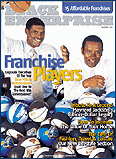The smartcard is emerging as a major e-commerce tool
By Fiona HaleyBlack Enterprise
The EZ-Pass that pays tolls from a distance. A driver's license with real-time information. A bracelet that stores personal account information. Dog tags that wirelessly transmit a soldier's name, rank, and serial number. All this is made possible through smartcard technology, and in five years it will likely be everywhere.
A smartcard looks like a credit card, but instead of a magnetic strip on the back, it is embedded with a computer chip loaded with data. The card's microprocessors can execute a range of applications and are periodically refreshed for additional use. Smartcards have been standard in Europe for years, with more than 300 million chip cards issued in 1993. They have been steadily trickling into America over the past several years and are due for an explosion in the very near future, says Gregory Thornton, CEO of Competech SmartCard Solutions in New Jersey.
Thornton's success in the field is a result of smartcard's growing popularity. He is finalizing a new $50 million venture that could help revolutionize the healthcare system in several African countries—including Uganda and Nigeria—where the ministries of health and district health centers are working independently of each other.
With the help of several partners, Thornton plans to use smartcard technology to organize aid programs and upgrade healthcare infrastructures. His group will act as a liaison between pharmaceutical companies, the U.S. government, and the governments of several European and African nations.
The arrival of satellite-enhanced, high-speed Internet service will vastly improve computer systems within various African health ministries and village health centers. Each center will receive a smartcard reader while mobile medical centers will inoculate patients who have received a bracelet carrying their entire medical history. When the patient comes within 9 feet of the smartcard reader, their medical history will be automatically transmitted to the doctor's handheld computer. The mobile unit will return to the village health center and upload the patient's information, which will then be immediately transmitted to the Ministry of Health's database.
Competech's annual revenues were $1.2 million in 2004. Thorton predicts revenues could reach $8 million in 2005 as a result of the African projects and a growing demand for smartcard technology. "Only 2% of the market is satisfied for smartcards," says Thornton. "The applications for this technology are endless; it is limited only by the imagination." He adds that smartcards could soon become as essential as dog tags for soldiers. The possibilities include hotel keys that act as both debit and Medicaid card.
JPMorgan Chase is already up on the trend. It has been experimenting with smartcards through its "Blink" program, which allows consumers in 160 cities in Georgia and 70 in Colorado to pay for purchases by passing their card in front of a point-of-sale terminal equipped with a contactless reader.
The technology makes blink cards ideal for fast-food restaurants and other businesses for which expediency is essential. In Georgia, the cards can be used at CVS drugstores, KFC, and Royal Cinemas. In Colorado they are accepted at Arby's restaurants, 7-Eleven, and Walgreens drug store chains.
"It's a regular credit card," says Tom O'Donnell, senior vice president at Chase. "When we test-drove the idea, people told us that they wanted a card that does everything. And if it had a feature that made it faster and easier to pay, it would be good. You can use it for all of your purchases."
O'Donnell predicts that in a few years, smartcard technology could make cash transactions obsolete. "People will need less cash," he says. "We see a big movement away from cash. Restaurants, pharmacies, convenience stores—businesses that are very cash-focused accept cards because consumers demand it. Consumers want to pay using plastic."
![]() Email Article
Email Article
![]() Print Article
Print Article




